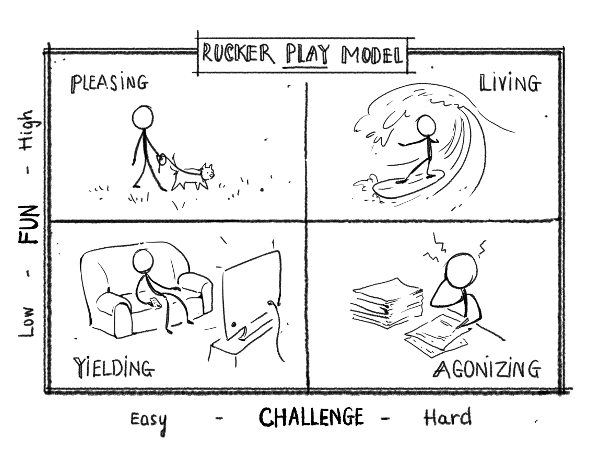Lately, there has been a lot of concerning news about what we know about happiness. The latest hypothesis is that if you want to be happy, simply stop trying to be happy. But what if you are just looking to have more fun?

If you have been following my stuff, you likely already know I am a charter member of the International Positive Psychology Association (IPPA). Back in the early days of the IPPA — and the positive psychology movement — most of us practitioners were drinking the proverbial Kool-Aid. We sincerely believed we could all be happier if we were just given the right tools.
In 2013, the movement began to go off the rails. One of our figureheads, Barbara Fredrickson, had her seminal work on flourishing debunked because the statistical analysis used to support it (re: critical positivity ratio) was shown to be contrived. Dr. Fredrickson tried to backpedal, but the original fissure started by Barbara Ehrenreich’s book Bright-sided: How Positive Thinking Is Undermining America had now been cracked wide open.
You may not be happy, but you can almost always have fun
That is, in part, why I have turned my focus to fun. We either do or do not have fun, and we can either not be or be happy. The verb distinction here is important as a linguistic construct: having fun vs. being happy.
Fun is not an elusive state. No. Fun is something you do. Unlike happiness, having fun is an active choice we generally have the power to make (barring extraordinary circumstances).
BEGINNER LEVEL
If fun has been elusive, this is how you find it
Take out a piece of paper and list out the answers to these questions.
- What are some of the things you did for fun as a kid?
- What are some of the things that used to bring you joy that you are not doing today?
- What are some of the things you enjoy today that you wish you could do more?
Start to discover what brings you joy by looking at your past and reminding yourself what these things are. You may simply need to prioritize the time and space to make these things happen again.
If you find you are no longer connected to what brought you joy as a child move on to the second two questions. This doesn’t have to be done in one day; track what brings you joy in your typical day over the course of your week. You may surprise yourself when you discover it is not something you would have initially put down answering the questions above.
Another thing that may surprise you is that you find what actually brings you joy is not comprised of grandiose adventures, but rather things that are easy and simple: connecting with friends, a long-lost hobby or a shared experience with your child. Increasing the fun in your life can be as simple as starting your day with a “yay” tone, finding reasons to celebrate the life you are living and making experiencing joy a habit rather than a quest.
INTERMEDIATE LEVEL
Did you lose joy and need to find it again? Or, do you need to discover it?
We have looked at two ways to discover fun. One focusing on the past and rediscovering what once brought you joy, and one considering the present and discovering what brings you joy now.
This represents two distinct (though not mutually exclusive) ways of finding fun and looking for joy. We could link rediscovery (past-oriented) with the so-called “fixed theory of interests,” which assumes that our interests are inherent and rather fixed throughout our life. Discovery (present-oriented), on the other hand, links with the “growth theory” and implies that we can develop our interests through investigation and self-discovery (O’Keefe et al., 2018). You can help determine your perspective (fixed vs. growth) by asking yourself the following questions:
- Do you believe your joy is waiting inside you waiting to be revealed?
- Or, are you willing to invest some effort to find your fun?
Professor Carol Dweck and Dr. Gregory Walton of Stanford University and Dr. Paul O’Keefe of Yale explored our search for passion by applying the fixed and growth theories.
Do you like to stay in your lane or explore uncharted territory?
O’Keefe, Dweck and Walton based their research on Dweck’s previous work on fixed vs. growth mindsets. Let’s look at the search for joy and fun through the lenses of their findings.
In a set of experiments, O’Keefe, Dweck and Walton showed that similar ideas can be applied to our personal interests. For instance, students who have a fixed mindset about their interests are less open to ideas outside of their interests. Furthermore, when we believe our interests are inherent, we meet challenges by dropping our interests. It would seem, when we believe our interests are innate, we do not want to invest time and effort to develop new ones. In this context, that is not necessarily a bad thing. If this is you, you like what you like. The next step is to put effort around prioritizing these activities.
The opportunity and warning for growth-minded fun seekers
People with a mindset that possesses a proclivity for growth and exploration have options for seeking out fun that are as limitless as their imagination. However, Dweck and colleagues conclude that the dictum “find your passion” might not be the best advice. According to their experiments, “develop your passion and see it through” is a better approach.
For those of us with a growth mindset, applying these theories to our search for fun implies we should be cautious of jumping from one thrill to the next. It is clear greater levels of joy are obtained through mastery, which is impossible without attention and effort.
ADVANCED LEVEL
Hardship can be the best time to reconnect with fun
Big life events can stir us awake, especially the shitty ones. Dark times encourage us to re-evaluate life and provide space for important yearnings to resurface. When we get through the pain, it often better enables us to say yes to the important and no to the unimportant. It is an unfortunate reality that the path to joy is often born out of painful circumstances.
Family and fun
Some will have you believe that marriage and kids can put a stop to fun. Which, honestly, is often true in the short-term.
However, not reconnecting to the fun eventually (after you’ve taken the necessary time to adjust to the inherent change of marriage and children) can have dire consequences.
The secret is to reconnect to fun together
Amy Claxton and Maureen Perry-Jenkins of the University of Massachusetts Amherst found that leisure time correlates with marital satisfaction. Claxton and Perry-Jenkins interviewed 147 couples across their transition to parenthood. Their findings suggest that spending leisure time together is particularly important for reducing marital conflict. This study is not an isolated finding — previous studies have also confirmed that sharing quality leisure time with your partner can lead to higher marital satisfaction (Crawford et al., 2002).
Takeaway: If you have a partner, make sure to include them as you look for ways to improve opportunities for fun. According to science, sharing in leisure time both partners enjoy has enduring, positive effects on relationships.
So don’t forget to live and have fun!
“To live is the rarest thing in the world. Most people exist, that is all.” —Oscar Wilde
Living life through purposeful and meaningful activity is when the magic happens. We need to move from seeking to finding. What is required is a deep conviction that you are worth it, that you have control over how you spend your time and that you deserve joy now.
Sources & further reading:
Claxton, A. & Perry-Jenkins, M. (2008). No Fun Anymore: Leisure and Marital Quality across the Transition to Parenthood. Journal of Marriage and Family, 70(1), 28-43.
Duane W. Crawford, Renate M. Houts, Ted L. Huston, & Laura J. George. (2002). Compatibility, Leisure, and Satisfaction in Marital Relationships. Journal of Marriage and Family, (2), 433-449.
Hayward, C., & Taylor, J. (2011). Eudemonic well-being: Its importance and relevance to occupational therapy for humanity. Occupational Therapy International, 18(3), 133-141.
O’Keefe P. A., Dweck, C. S., & Walton, G. M. (2018). Implicit Theories of Interest: Finding Your Passion or Developing It? Psychological Science, 29(10), 1653–1664.
Royeen, C. l., Stein, F., Murtha, A., & Stambaugh, J. (2017). Eudemonic Care: A Future Path for Occupational Therapy? Open Journal of Occupational Therapy (OJOT), 5(2), 1–10.

